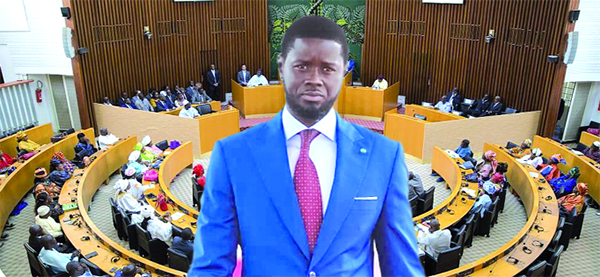Pastef’s Legislative Victory: DIOMAYE IN THE EMERGENCY WARD

This year, the draft initial Finance Law (Lfi) 2025 will be examined within exceptional deadlines, announced yesterday, Bassirou Diomaye Faye. Thus, he asked the government to accelerate the preparation of the said project.
After a victory in the Legislative elections, the President of the Republic instructed the government to get to work to deal with emergencies. Diomaye Faye « asked the Prime Minister, the Minister of Economy, Planning and Cooperation, and the Minister of Finance and Budget, to speed up the pace in order to finalize the preparation of the draft Finance Law for the year 2025 which will be examined within exceptional timeframes ».
Read the column – The President is a good son; his Prime Minister too…
As a reminder, at the same time last year, the starting signal for the 2024 budget marathon had already been given by the MPs of the 14th Legislature to examine the draft Finance Law 2023 and then proceed with the adoption of the budget of the various institutions of the Republic.
The press release of the Council of Ministers stated that The Head of State, « has, in the same spirit, magnified the quality of the government’s work during the previous eight months of this exceptional year when Senegal organized two major national elections. He praised, at its fair value, in this phase of rectification, adjustment and accountability, the exemplary mobilization of each member of the government. »
Read the column – 5 years to keep the promises
Another emergency mentioned by President Faye was « the marketing campaign for agricultural production. » In this regard, he asked the « government to ensure the preservation of producers’ interests, fair remuneration for their production and the development of national industry with a view to consolidating economic sovereignty. He asked the government to take all appropriate measures to adequately set the price of a kilogram of peanuts for the producer. »
[themoneytizer id= »124208-2″]
He also « invited the Prime Minister and the Ministers responsible for Agriculture and Industry to define, in consensus with the operators and industrialists of the sector, a method of intervention on the peanut markets. This will ensure the security of producers’ income and the modernization of the industrial tool for local processing of national peanut production. To close this chapter, he asked the Prime Minister to hold, as soon as possible, an inter-ministerial council on the agricultural marketing campaign. »
By Dialigué FAYE / dialigue@lequotidien.sn

